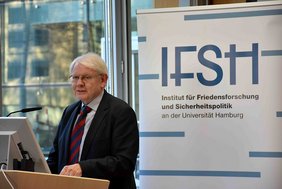The IFSH’s disarmament expert Professor Dr Götz Neuneck has been received by both the former German Minister for Foreign Affairs Sigmar Gabriel and the Russian foreign minister Sergej Lawrow. Dr Neuneck’s judgment and expertise were and still are in demand at the highest levels of government worldwide. Dr Neuneck worked at the IFSH for 30 years, where he served as deputy director of the institute and made the IFSH known around the world. Dr Neuneck entered into retirement in mid-October. In his honour, the IFSH and the Federation of German Scientists (VDW) organised a symposium on the topic “Natural Sciences and Peace Research.” In addition to institute faculty, many friends and acquaintances travelled from near and far to see Dr Neuneck off.
IFSH and Federation of German Scientists (VDW) Gala
During his 30-year tenure at the IFSH, Neuneck served in various capacities including that of advisor, head of the Master’s programme Peace and Security Studies, acting head and deputy director of the institute. He concerned himself with many topics central to peace studies, ranging from preventative arms control to space armament, nuclear disarmament and missile defence. Professor Dr Ursula Schröder, director of the IFSH, emphasised how important Neuneck’s work has been for the development and continuation of scientific peace research. The necessity of this scientific work in peace and conflict research has recently been highlighted in a report by the German Council of Science and Humanities (WR) as well as by prominent political figures. Certain topics in scientific peace research are more relevant than ever given the current threat of arms races, Dr Schröder said.
Chairman of the Federation of German Scientists Professor Dr Dr h.c. Harmut Graßl emphasised that, despite the different paths their lives as physicists have taken, he and Dr Neuneck remained united by the view that the scientific community must assume greater responsibility by presenting its findings to the public, advising on policy, and preventing the misuse of scientific findings. The discovery of nuclear fission taught physicists this lesson the hard way. Dr Graßl argued for greater co-operation amongst individual disciplines in order to counteract fragmentation in the scientific community. In addition, Dr Graßl said he was pleased that Dr Neuneck was retiring only from the IFSH, and not from his position as German representative to the Pugwash Conferences. The 1995 Nobel Peace Prize awarded to Pugwash showed that it had succeeded in “reducing the threat posed by nuclear weapons in international politics”, Dr Graßl said.
War and Peace: The particular responsibility of the natural sciences
Dr Neuneck subsequently delivered a farewell lecture on the topic of “Natural Sciences and Peace Research”. In his lecture, Dr Neuneck also emphasised the need for interdisciplinary peace research. The natural sciences, he said, play a special role when it comes to the central questions of war and peace, as the current challenges in arms control have shown.
In the panel discussion that followed, Dr Kathryn Nixdorff, Professor of Microbiology at TU Darmstadt, Dr Malte Göttsche, Junior Professor at the RWTH Aachen, and Dr Jürgen Scheffran, Professor of Integrative Geography at the Universität Hamburg, delved into the question: How can and must we meet the security policy challenges of the future?
Following the symposium, a reception was held in honour of Dr Neuneck, who received many farewell gifts from his colleagues.
View more photos from the event here.
